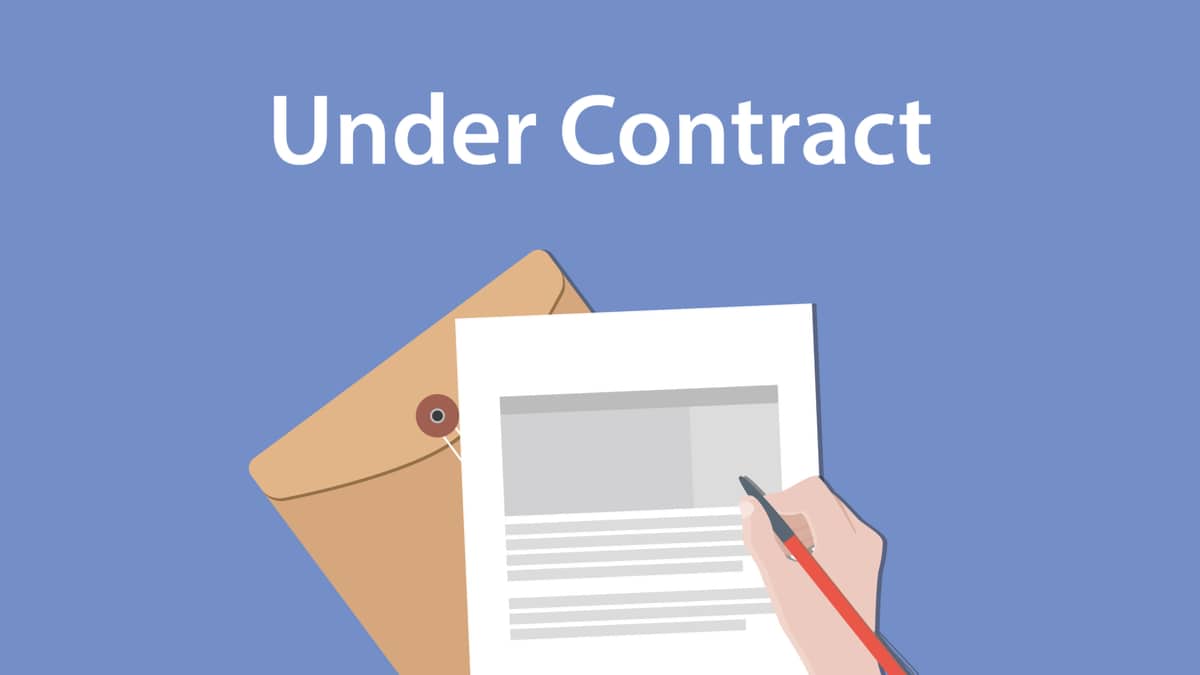
Published
Under contract defined | Can someone else buy the house? | What is a backup offer? | What happens under contract? | Other listing statuses | Zillow under contract | Should you make an offer? | FAQs
“Under contract” definition
In real estate, “under contract” means that a buyer has made an offer on a home and the seller has accepted.
The buyer and seller have agreed on a purchase price and signed a formal agreement outlining the terms of the sale.
While going under contract is a big step toward completing a home purchase, it doesn’t yet signal a done deal. The parties still need to sort through a number of details before the home sale can be finalized. And hiccups can happen along the way.
While a majority of home purchase agreements are executed as intended, approximately 24% are delayed, and 6% are terminated altogether.
From financing issues to buyers getting cold feet, home purchase contracts fall through for a variety of reasons.
So don’t count yourself out of the running just because a home you like is already listed under contract.
Can a home under contract be sold to someone else?
Absolutely! Just because a house is under contract doesn’t necessarily mean it’s off the market to other buyers.
In most cases, certain conditions, known as contingencies, must be met before a real estate transaction can move forward.
Contingencies protect buyers from having to go through with a home purchase that may not be in their best interest. They can also protect sellers from being stuck in a contract indefinitely – say, if the buyer can’t secure financing or find a buyer for their current home.
Common contingencies written into real estate contracts include:
- Appraisal contingency: Required by mortgage lenders on most home purchases to ensure the actual property value is at or above the sale price, allowing the buyer to renegotiate if not.
- Inspection contingency: Provides the buyer with an opportunity to have the property professionally inspected and negotiate the purchase price or cost of repairs based on the findings.
- Financing contingency: Gives the buyer an out if they’re unable to secure the financing needed to purchase the home.
- Title contingency: Protects the buyer from any issues with the title, such as liens or a dispute over the property’s ownership.
- Prior home sale contingency: Allows the buyer to opt out of the contract if they’re unable to sell their current home by the deadline listed in the contract.
If a contingency isn’t resolved by the established deadline, either party can choose to terminate the contract. The seller is then free to put the property back on the market or consider backup offers from other buyers.
🔢 By the numbers
As of November 2021, 81% of home contracts included an inspection contingency, while 79% were contingent on the appraisal.
What is a backup offer?
In real estate, buyers submit a backup offer to place themselves next in line should the existing offer fall through. If accepted by the seller, a backup offer is a legally binding agreement that automatically puts you under contract with the seller once the original buyer backs out.
It’s worth noting that a seller can’t cancel an existing contract to accept a backup offer, even one that comes in at a higher price.
While the buyer may have an out through contingencies, sellers are typically locked into the sale as soon as it goes under contract.
For the house to go to another party, the initial buyer would either need to breach the established contract or back out.
If you’re interested in a home that’s under contract, reach out to a real estate agent about submitting an offer. Your agent can look into the status of the sale and any other backup offers already in place.
In competitive markets, you might see as many as five backup offers on a single property.
What happens when a house goes under contract?
Once a house is in contract, buyers and sellers have to jump through a series of hoops to ensure the deal is executed by the deadline they agree on in the contract.
Most real estate transactions follow a similar process leading up to a property changing hands.
The home-buying process
- By the time a home goes under contract, a buyer has seen it, decided they wanted it, and submitted a formal offer through their real estate agent.
- At this point, the buyer may go back-and-forth with the seller over the finer details like move out date and what appliances stay with the house.
» READ: 20 Things to Negotiate When Buying a Home
- Once the seller accepts a buyer’s final offer, the listing agent draws up a formal purchase agreement to be signed by both parties, at which point the home is officially under contract.
- The buyer then deposits money into an escrow account, which serves as a security deposit for the seller, in case the contract falls through.
» READ: What is Earnest Money and the Good Faith Deposit?
- From there, the contract undergoes a contingency period — usually anywhere from 10–60 days — during which the buyer secures financing, the home undergoes an inspection and appraisal, and the property title is checked for any liens or ownership disputes.
- As contingencies are met and removed, the sale proceeds to the pending phase. All that’s left is for the buyer to complete a walkthrough of the property and for both parties to sign the final closing paperwork.
With the closing paperwork signed, the title company files the deed with the county clerk, and the home is officially sold.
For a house under contract, the closing process can take anywhere from a week to two months, with the average being 46 days, according to Ellie Mae. During that time, any number of things can happen that cause a deal to fall through.
What could make a home purchase contract fall through?
The most common reasons for a home purchase to fall through include issues with appraisals, inspections, and financing. These generally come up during the contingency period.
Contingencies aside, it’s possible that the buyer simply gets cold feet. In fact, many home purchase agreements come with what’s called an option period written in. This gives the buyer an out from the contract while it’s still in its early stages.
An option period is an agreed upon length of time, often 7–10 days, in which a buyer can back out of a contract for any reason without penalty.
A real estate transaction that’s still within its option period is often called an active option contract. An active option contract indicates that the home is still being marketed in case the deal falls through.
Each real estate transaction comes with its own set of unknowns. Some are more complex than others, and therefore more likely to run into issues that result in the contract being terminated.
When an initial deal falls through due to unmet contingencies or other concerns, it opens the door to other prospective buyers.
Under contract vs. contingent vs. pending
Think of under contract as an umbrella term that applies to any property listing for which a seller has accepted a formal offer from the buyer.
The more precise terms contingent and pending signal the stages of progress through the terms of that contract.
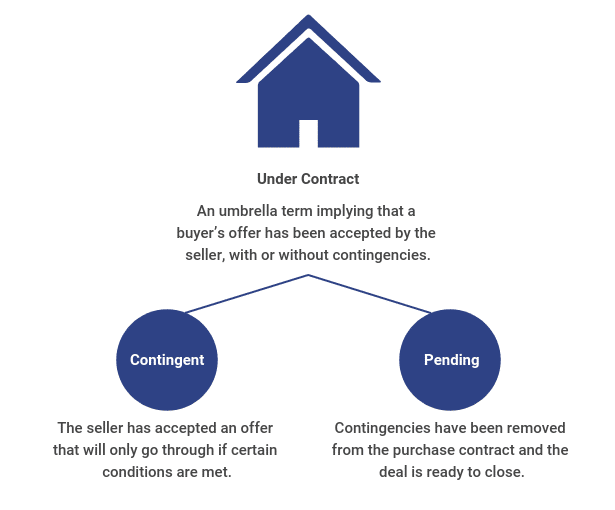
Contingent status
When a home is listed as contingent, it generally means that a signed purchase agreement is in place and the parties are working through whatever contingencies were written into their contract.
For a prospective buyer, the contingency period signals the time when an existing offer is at the greatest risk of falling through. If you fall in love with a home marked as contingent, check with your agent about submitting a backup offer.
Pending status
Once contingencies are removed and the deal is cleared to close, the listing status progresses to pending. At this point, little – apart from a major life event such as a job loss – can derail the deal.
Are listing statuses the same in every market?
The meaning of terms like contingent and pending may vary slightly depending on where you see them listed.
In San Diego, for instance, a property progresses to pending as soon as it goes under contract. This is true even if appraisal or financing contingencies are still attached. In other places, like Chattanooga, TN, a property moves to pending only after all of the contingency hurdles are cleared.
Below are examples of the listing statuses applied by two different Multiple Listing Services (MLSs). MLSs are local, online marketplaces where Realtors share their listings and invite other brokers to bring buyers to the sale.
MLS status definitions: two examples
| 📕 METROTEX Association of REALTORS | 📕 San Diego MLS | ||||
|---|---|---|---|---|---|
| Active | Property is available for sale and must be available for showings. Will expire on the original expiration date the agent entered. | Active | A valid listing contract exists and no offer (with or without contingencies) has been accepted. Property is available for showings. | ||
| Active Contingent | Seller has accepted an offer but has requested that property remain available for showings and Seller will entertain backup offers. Will expire on the original expiration date the agent entered. | Contingent | Offer has been accepted contingent on the sale of the buyer’s property with 72 hour first right of refusal or offer has been submitted to lender or REO (real estate owned property) agent. | ||
| Active Option Contract | Seller has accepted an offer but the Buyer is exercising the option period from the sales contract. Still available for showings and backup offers. Will expire on the original expiration date the agent entered. | Pending | The Seller has accepted an offer. | ||
| Active Kick Out | Property has an offer contingent upon the sale of another property by buyer. Still available for showings and backup offers. Will expire on the original expiration date the agent entered. | ||||
| Pending | Property has an offer (Contract with no contingencies, Kick Outs or Options). The seller requests no further showings and does not want to entertain backup offers. Pending listings do not expire and will stay pending until closed. | ||||
You can see that contingent applies to a much narrower set of criteria in the San Diego market than it does in north Texas, while pending takes on a much broader meaning.
Additionally, Texas specifies three sub-categories of contingent – active contingent, active option contract, and active kick out – depending on the circumstances upon which the contract is contingent.
Other markets may use different listings statuses, and not all MLSs publish these definitions publicly. Therefore, it can be difficult to determine whether a home is still accepting offers or not.
If you see a home you’re interested in, have your agent double-check the status with the listing agent. The term you see appended to an online listing may not paint the most accurate picture.
What does under contract mean on Zillow?
On Zillow, a home is considered under contract when “the seller has accepted an offer, but the sale is not yet complete.”
Pretty vague, right?
Seeing the words “under contract” appended to an online listing won’t tell you much about where the real estate transaction stands. It won’t, for example, tell you whether the seller is still accepting backup offers. Depending on the market, a home under contract may or may not still have contingencies attached.
To make matters more confusing, an under contract status on Zillow might not even match the status that appears on the original MLS listing.
In some cases, listing platforms like Zillow override the statuses supplied by various MLSs. The idea is to cut down on confusion by using fewer, more uniform listing statuses across the site. Therefore, you might notice discrepancies when looking at the same listing across multiple websites.
Here, for example, a property is marked “under contract” on Zillow.
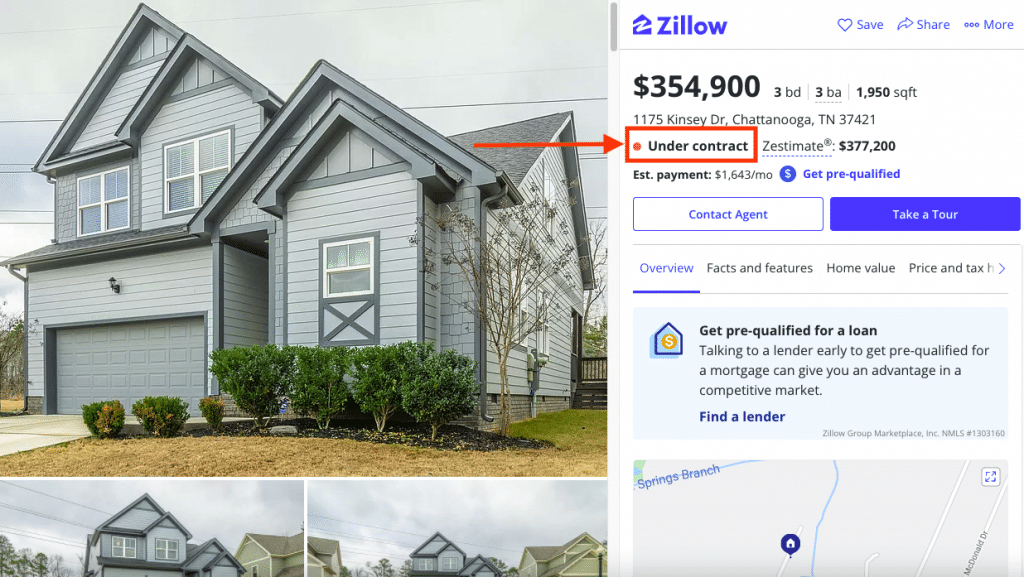
However, that same property shows up under the more precise term, “contingent,” on Redfin.
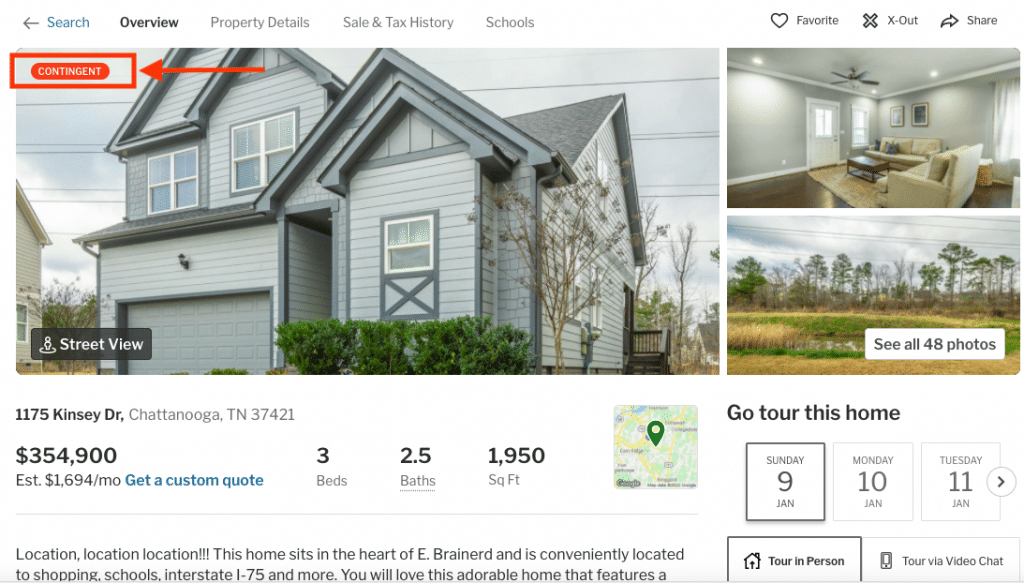
Why does Zillow show a different status than Redfin?
It’s not uncommon to see Zillow and Redfin display different statuses for the same listing. To a prospective buyer, they mean the same thing. However, Zillow is more likely to apply the term contingent if the seller is accepting backup offers. Otherwise, Zillow will categorize a listing as either under contract or pending. It depends on the market and the MLS that supplies the listing.
Compared to Zillow, Redfin maintains a larger library of listing statuses. This allows for greater specificity and thus more alignment with what appears on the original MLS listing.
As a result, a home marked “contingent” on Zillow may appear as “contingent,” “active under contract,” or “accepting backup offers” on Redfin.
Given the inconsistencies in the way status definitions are applied across MLSs and other listing platforms, it can be hard to determine whether a home is still on the market based on the listing status alone.
When in doubt, reach out to your real estate agent to check on the status of a home sale. You don’t want to miss out on a house you love due to a simple misunderstanding about the listing status.
Should you make an offer on a house that’s under contract?
Even if a home is under contract, you may still want to to submit a backup offer. This is especially true if it’s a property you love.
👍 Pros
- With a strong backup offer, and little luck, you might just land your dream home.
- Additionally, once your offer is accepted as a backup, the price is locked in. It stays locked even if home values continue to rise during the weeks or months that the initial offer is on the table.
However, be aware that backup offers come with some potential cons.
👎 Cons
- First, prepare for the likelihood that your backup offer may not materialize. About 94% of initial home-purchase agreements eventually turn into a sale. Even if the initial purchase doesn’t go through, you may have other backup offers to contend with.
- A backup offer is binding once it’s accepted, so it might be hard to back out if you find another home in the meantime.
- Since an accepted backup offer requires a deposit of earnest money, it may take some time to get it returned if you wish to back out and use it for another home.
- You might inherit the same problems the first buyer ran into. For example, if the original deal fell apart because the home didn’t appraise for the asking price, you may be in for a tough negotiation with the seller over who makes up the difference.
- Finally, if you discover a home once it’s already under contract, you might have to submit your backup offer sight unseen. Many sellers no longer accommodate home tours once they’ve accepted an initial offer.
How to put in a backup offer on a house under contract
If you’re intent on putting in a backup offer on a home you love, talk to an agent to find out more about the existing purchase agreement, any other backups that might be on the table, and what’s of utmost concern to the seller.
While price is always important, you can sometimes gain an advantage over other backup offers by:
- Giving the seller flexibility with the move out date
- Depositing more earnest money upfront
The latter gives the seller some additional financial padding in case the deal falls through.
An experienced local agent can help you determine the right offer price. They can also help you decide on any contingencies you want to put in place and negotiate the terms of the purchase agreement (like the move out date and who pays what share of the closing costs).
Frequently asked questions
What are the chances that a house under contract will fall through?
The National Association of Realtors places the odds of a home purchase contract falling through at 6%. However, this can vary by market, with some agents claiming as high as 20%.
Can you tour a home that’s under contract?
That depends. Sometimes a seller will continue to market their home while under contract, especially if there’s a chance that the offer will fall through.
Other times, sellers prefer to close off their home to additional home tours once a solid offer is on the table. If you’re interested in touring a home that’s under contract, it’s best to check with your agent.
Can you make an offer on a house that’s under contract?
Often, that is the case!
When a home goes under contract, but the sale is contingent on certain conditions – like a clean inspection report and an appraisal at or above the offer price – sellers will sometimes solicit backup offers to lock in a new buyer in case the original buyer backs out.
Recommended reading
20 Ways to Save Money When Buying a Home: There are several ways to save when purchasing your house. Learn our top 20 money-saving secrets!
Do I Need a Real Estate Agent?: Wondering whether or not you should work with an agent during your home search? Check out our guide to see if it’s the right move for you.
Millennial Home Buyer Report: 2022 Edition: The 2021 housing market was the most competitive on record. See what home buyers were willing sacrifice to own a home (and the decisions they regret most).


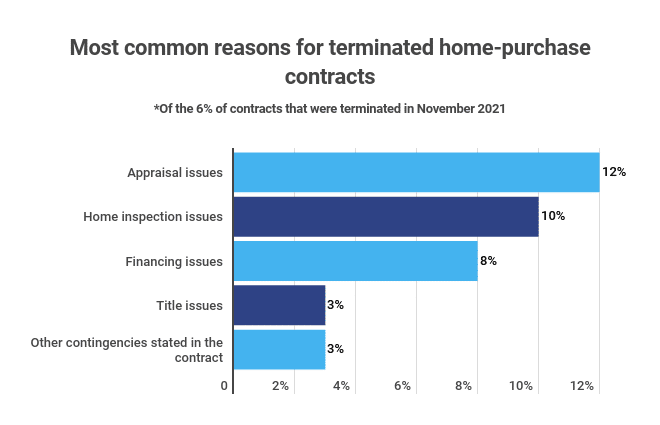
Leave a Reply